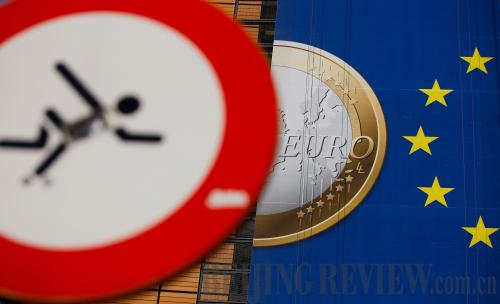|
 |
|
SLIPPING: The euro has been dropping in value as credit ratings on Europe's banks continue to fall (ZHOU LEI) |
The UK's decision was based on both economic and political considerations, he explained. Unlike countries on the European continent, such as Germany, Britain's economy relies more on finance than processing industries. Therefore, it will never let the EU determine its lifeblood. It is also not a member of the euro zone. It would cost too much if it accepted the EU's strict financial supervision and principles, which aim to solve the ongoing debt crisis spreading inside the euro zone. As Cameron told reporters after the summit, rejecting the treaty changes was the "right thing" for Britain. Getting stability in the euro zone was "good for European countries, good for Britain as well, but also we need to protect Britain's interests," Cameron said on December 8.
As early as the late 19th century, Britain followed a tradition of "splendid isolation," keeping itself seemingly detached from the continent. The tradition exists today, said Liu. Although Britain hopes to play a leading role in Europe, its top ally is always the United States. For now, Cameron's decision got support from over 60 percent of British citizens and the Conservative Party behind Cameron. Cameron's decision represents the general attitude of the country's majority on this question.
This definitely will put a chill in Britain's relationships with other EU powers, France and Germany. French President Nicolas Sarkozy publicly blamed Britain for failure to achieve full-fledged treaty changes among all EU member states. He condemned the British side for wanting to be exempted from certain financial regulations in the EU treaty changes.
The result of the summit mirrored the changed power structure of the EU. Since Britain showed an isolated attitude to the current crisis, Germany and France's status are on rise inside the EU. The fiscal compact was based on a joint proposal from France and Germany. However, the proposal reflected a more German stance than French. Liu noticed that during the past years, the two countries had been sharing equal influence inside the EU. But because Germany's economic strength has grown rapidly in recent years, the country is speaking in a louder voice than France.
Although France and Germany form a common stance on solving the debt crisis, their opinions are different on how to do it, Liu explained. Germany prefers to solve the problem by perfecting fiscal policies and regulations, which focuses on long-term benefits. But France would like to take measures that can take effect immediately, like issuing national bonds. Analyzing the agreed compact, people will find that Sarkozy almost totally accepted German Chancellor Angela Merkel's plan, giving up his early stance of launching eurobonds and making the European Central Bank play a bigger role. Germany believed issuing bonds is like stuffing an endless hole with money, so a long-term strategy will be the only way to cure the disease. However, Germany's choice is very risky, Liu pointed out. Because the crisis is infecting core nations of the EU, like France, betting on long-term effects will be like walking on a high wire. "Some nations inside the euro zone will eventually be hurt by the crisis," he predicted. But economic power enables political power. "Germany will act as the most influential nation when making decisions inside the EU, and the situation will sustain for some time," Liu concluded.
Differences inside the EU will weaken its power in the world. Liu said that in recent decades, the economic gap between Europe and the United States was getting larger and larger before the debt crisis. Now the crisis is dragging Europe down. With or without Britain, Europe cannot threaten the United States' leading position in the world. Liu said there is a big possibility that the European economy will fall into recession in 2012.
However, Liu pointed out that Britain will not abandon the EU. Being an influential country in Europe, Britain will not accept being isolated by France and Germany when making decisions about Europe. Moreover, France and Germany still want to keep Britain inside the union. "If Britain wants to take the helm of a big ship like the EU, it must get on board first," Liu said. |
